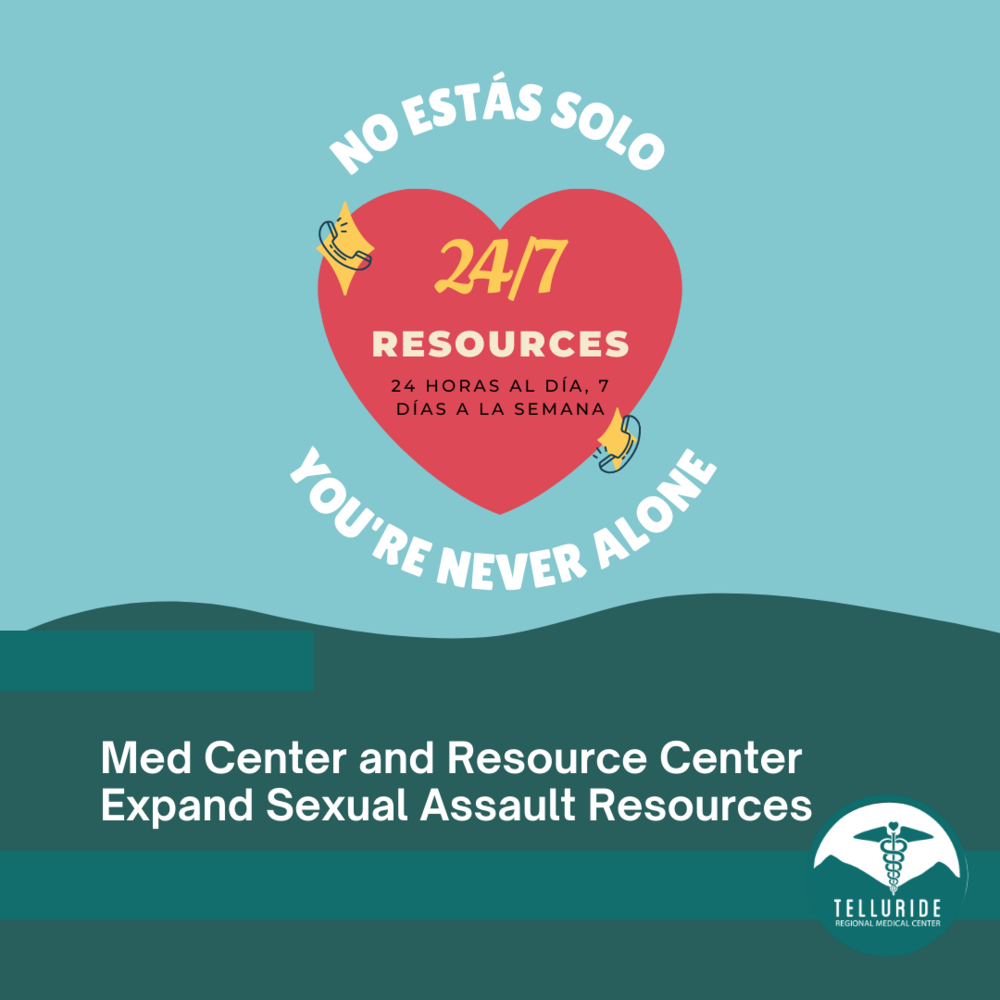
19 Apr Telluride Med Center & San Miguel Resource Center: Sexual Assault Resources Expanded!
If you have experienced sexual assault call the Telluride Regional Medical Center, 728-3848. If you would like to talk to someone call the San Miguel Resource Center, 728-5842. For more information visit tellmed.org/SANE or smrcco.org regarding available resources around interpersonal violence.
Register for vaccine here.
Support Telluride Medical Center’s COVID Fund here.
For more information surrounding COVID resources, testing and the concern form, visit here.
For more information surrounding the state’s COVID-19 dial, visit here.
For additional Telluride Medical Center (TMC) information on COVID, go here

The Telluride Regional Medical Center and San Miguel Resource Center (SMRC) have teamed up to fortify community resources for survivors of sexual assault with the launch of a collaborative Sexual Assault Nurse Examiner (SANE) program.
For more than a decade Betsy Muennich, RN has single-handedly managed SANE exams at the Med Center. Now, thanks to a collaboration and funding, there are a total of three providers trained as sexual assault examiners, allowing for 24/7 access to specially trained providers who can offer comprehensive and appropriate care for a survivor of sexual assault. Additionally, corresponding and expansive resources are offered in collaboration with SMRC advocates.
Shannon Dean, SMRC’s new Executive Director, sees the SANE program as a beneficial and necessary addition to the organization’s services. Of the nearly 200 people SMRC offered resources to last year, 10 percent were survivors of sexual assault.
“Having nurse examiners who are specifically trained to provide trauma-informed examinations following a sexual assault is imperative to victim wellness and the pursuit of justice. The practices learned through this program create a safe space for victims throughout their examination, so that evidence can be collected and the victim can be cared for without re-traumatization,” said Dean. “This process lessens the shame surrounding the examination process and leads to greater cooperation with law enforcement, and hopefully, an increase in immediate reporting.”
Any non-consensual sexual contact or behavior (including rape or attempted rape, unwanted touching, and sexual coercion) is considered sexual assault. The inability to give consent is also considered non-consensual, so someone under the influence of alcohol, drugs or other substances is not always able to consent. Sexual violence is a broad term that encompasses all sexual acts, committed or attempted, without consent or that occur when the person is unable to consent.
The FBI maintains a comprehensive definition of rape that includes any penetration (i.e., with a sexual organ or object) of a body orifice (e.g., vagina, anus, mouth) without consent.
The National Intimate Partner and Sexual Violence Survey revealed that 43.6 percent of women experience sexual violence in their lifetimes, with one in five women experiencing rape or attempted rape. While at the same time only 20 percent of rapes and sexual assaults are reported, according to the Justice Department.
“Our trained staff have education in trauma-informed care, forensic photography and evidence collection, judicial systems, protocols for sexually transmitted infection prophylaxis, pregnancy prevention and more,” said Dr. Christine Mahoney, primary care director.
A sexual assault exam is only one part of this broader community effort that aligns healthcare professionals, survivor advocates, law enforcement and prosecutors together to investigate and prosecute a reported case of sexual assault.
A goal of the SANE program, according to Tammi Ragan of SMRC, is to positively impact sexual assault responses from our agencies and the experiences of victims to ultimately result in a safer and more equitable community.
The main tenet of the sexual assault response program is to provide resources that accommodate the confidentiality and health of survivors of sexual crimes.
The choice to report an assault to law enforcement is a decision made only by the survivor, although certain cases are required to be reported to protective services.
For Emily McGough, a sexual assault nurse examiner, the number one priority is ensuring the survivor receives appropriate and confidential care.
“Once someone calls our clinic to initiate support, we discuss all options for the exam, and consent is obtained at every step of the process. We want to make sure that the survivor is aware of all the services available to them. Every part of the exam is the survivor’s choice, nothing is mandatory,” she said. “For support beyond the medical and forensic exam, SMRC offers counseling, translation services, safe housing, financial aid and more, all without limitations on time.”
A sexual assault exam should take place within five days of the assault. For collecting evidence, the recommendation is that the survivor be seen before takes a shower, uses the bathroom, drinks, eats, brushes teeth, or changes clothes since the incident occurred. Regardless of the circumstances however, support and services are available to all who have experienced sexual assault.
“It’s critical for survivors to get important medical care and have evidence collected if they decide to press charges. We have an excellent team here to support you, anytime of the day or night,” said McGough.
All conversations are confidential.
Funds to support the sexual assault healthcare training were awarded to SMRC by the Office on Violence Against Women. Elaina Collins, PA-C, and Emily McGough, BSN, RN participated in the training through UCHealth. Betsy Muennich, RN had previously been trained.
SMRC hopes to further expand services to the Uncompahgre Medical Center and the Basin Clinic by providing funding for more medical professionals to access SANE training.
“There is so much uncertainty with the current conditions of the pandemic, but we want the people of San Miguel County to know and trust that there are resources for them and that they are not alone,” said Ragan.


Sorry, the comment form is closed at this time.